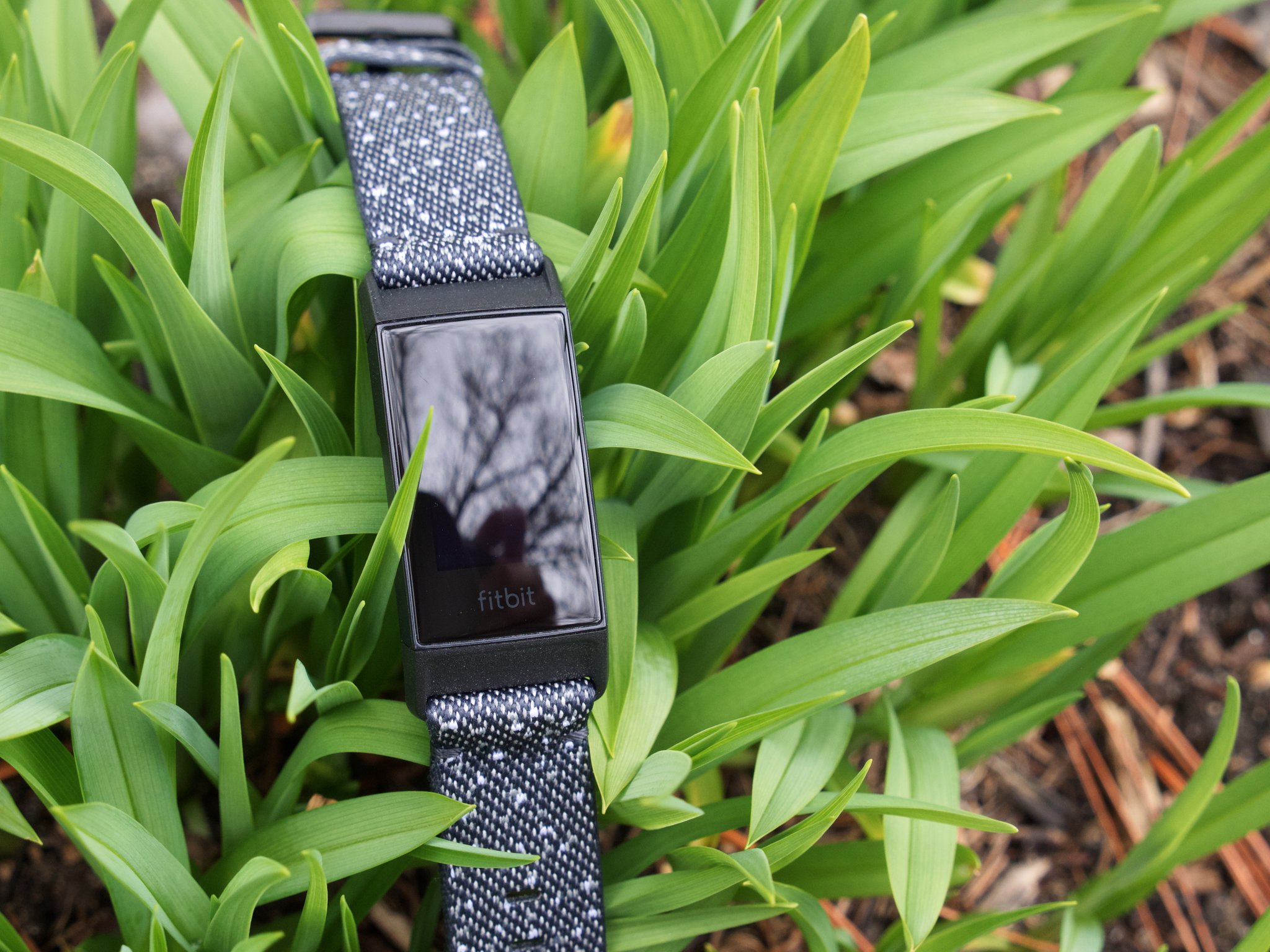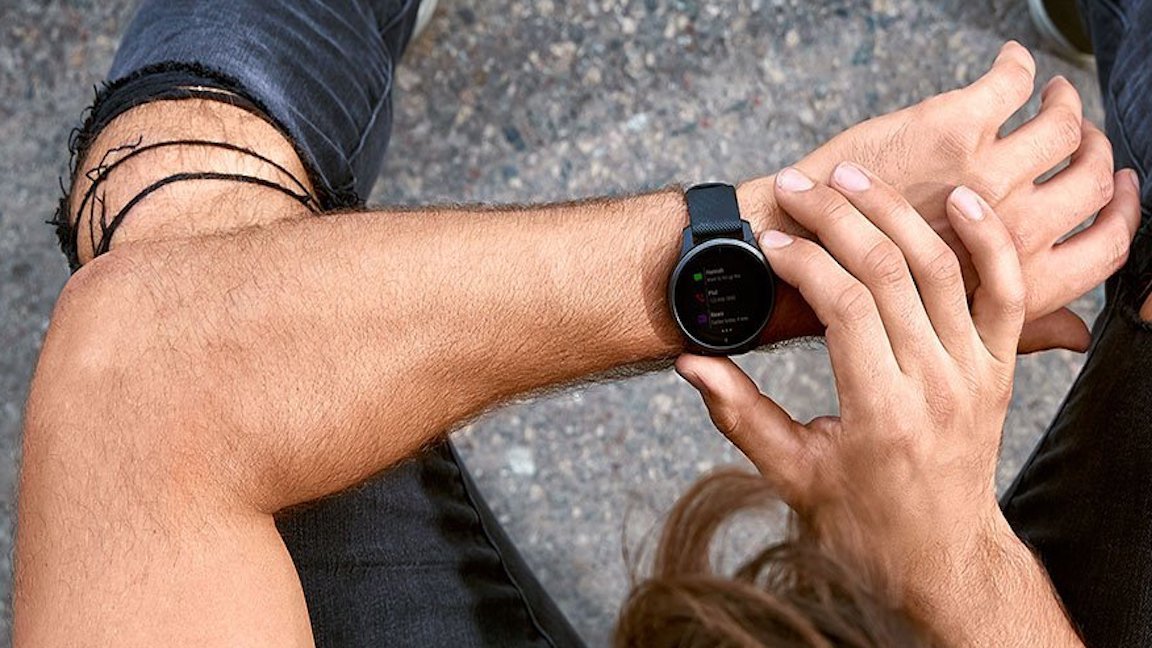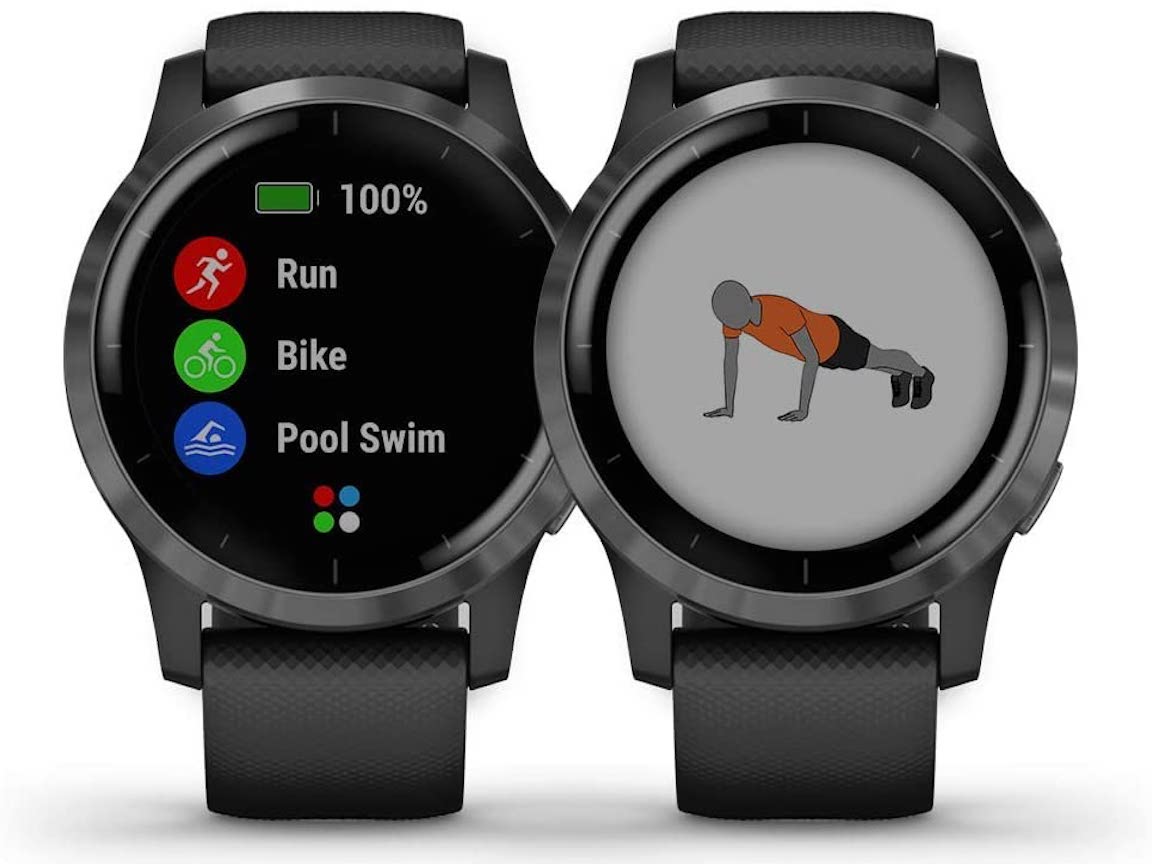Fitbit tracker
Fitbit Charge 4
Pros
- Built-in GPS
- Active Zone Minutes
- Health and fitness tracking
- Auto-workout recognition
- Sleek, lightweight design
- Seven-day battery life (Up to five hours in GPS mode)
Cons
- No music play, storage, or streaming
- Minimal app access
- No safety tracking
Fitbit's latest and greatest health and fitness tracker, the Fitbit Charge 4 features built-in GPS, auto-workout recognition, advanced health, fitness, and sleep tracking, and Active Zone Minutes. The battery can last up to seven days in multi-mode, and up to five hours in GPS mode. It's a great tracker and perfect if you don't care about using it for music and apps.
Garmin smartwatch
Garmin Vivoactive 4
Pros
- Built-in GPS
- Health and fitness tracking
- On-screen workouts
- Music play, stream, and storage
- Personalize with watch faces, apps, and widgets
- Eight-day battery life (Up to six hours in GPS and music mode)
Cons
- No auto-workout recognition
- Bulkier, heavier design
- Display can be difficult to read
The Garmin Vivoactive 4 enables you to keep a close eye on your overall wellness with a broad range of all-day health and fitness monitoring. Easily download music and connect to wireless headphones for phone-free listening, get easy-to-follow, animated workouts right on your watch screen, and up to eight days of battery life with this feature-packed smartphone.
The Fitbit Charge 4 is jam-packed with many of Fitbit's best features like built-in GPS, auto-workout recognition, Active Zone Minutes, health and fitness monitoring, and advanced sleep tracking. It's sleek and lightweight and has an easy-to-read display and easy-to-use touchscreen. It definitely comes out on top when considering design and usage.
The Garmin Vivoactive 4 wins when it comes to connectivity and features. It enables you to connect to one of the best true wireless earbuds and store, stream, and play music phone-free. It gives several safety tracking options and allows you to really make it your own with apps and widgets on top of advanced health, fitness, and sleep tracking.
Fitbit Charge 4 vs Garmin Vivoactive 4: Breaking down the specs
So, which is for you? Let's break down the specs to find out exactly how these two are alike, and where they differ.
| Fitbit Charge 4 | Garmin Vivoactive 4 | |
|---|---|---|
| Dimensions (in millimeters) | 35.8 x 22.7 x 12.5 mm | 45.1 x 45.1 x 12.8 mm |
| Weight (in grams) | 27 g | 51 g |
| Display | OLED | MIP |
| Touchscreen | Yes | Yes |
| Smartphone compatibility | Android and iOS | Android and iOS |
| Affiliated apps | Fitbit | Garmin Connect |
| Smart notifications | Yes | Yes |
| Bluetooth connectivity | Yes | Yes |
| Wi-Fi | No | Yes |
| Connect with wireless headphones | No | Yes |
| Customizable clock faces | Yes | Yes |
| Music storage | No | Yes |
| Music streaming | No | Yes |
| Safety tracking | No | Yes |
| Swim-proof (up to 50 meters) | Yes | Yes |
| Sleep tracking | Yes | Yes |
| All-day activity tracking | Yes | Yes |
| Stress tracking | Yes | Yes |
| Menstrual cycle tracking | Yes | Yes |
| 24/7 heart rate monitoring | Yes | Yes |
| Abnormal heart rate alerts | No | Yes |
| Pulse Ox | Yes | Yes |
| Preloaded sport modes | Yes | Yes |
| Auto-workout recognition | Yes | No |
| Compass | Yes | Yes |
| Barometric altimeter Yes | Yes | |
| Accelerometer | Yes | Yes |
| Find My Phone | No | Yes |
| Find My Watch | No | Yes |
After breaking down the specs, you can see that these two are actually quite similar despite one being a tracker and one being a smartwatch. There are important features to highlight and some key differences that should be considered when deciding which to buy.
Fitbit Charge 4 vs Garmin Vivoactive 4: Design
The Fitbit Charge 4 features a sleeker, lighter design than the Garmin Vivoactive 4.
Let's talk design. The Fitbit Charge 4 features a much lighter, sleeker design than the Vivoactive 4. The Charge 4 comes in four customizable color options: black, rosewood, blue, and granite (Special Edition), and you can make it your own even more with customizable watch faces. The Garmin Vivoactive 4 only comes in two basic colors: black and gray. However, you can customize the Vivoactive 4 further with different watch faces, apps, and widgets.
You can also opt for the Garmin Vivoactive 4S which is the same as the Garmin Vivoactive 4 but features a slightly smaller watch face. Note that the Fitbit Charge 4 is still lighter and sleeker than the Vivoactive 4S. The 4S comes in four different colors: pink, white, gray, and black.
OLED is considered the pinnacle of picture quality.
When considering display, the Fitbit Charge 4 delivers a reputably clearer image. It features a backlit OLED display that responds well to natural swiping and scrolling. Organic light-emitting diode technology or OLED is considered the pinnacle of picture quality. The Garmin Vivoactive 4 features a transflective memory-in-pixel or MIP display.
It's important to note that many reviewers wish the Vivoactive 4 MIP display delivered a sharper image. They find it somewhat blurry and therefore difficult to read. When it comes to display definition, the Fitbit Charge 4 comes out on top. Both the Charge 4 and Vivoactive 4 feature easy to use touchscreens.
Fitbit Charge 4 vs Garmin Vivoactive 4: Key differences
Both are compatible with Android and iOS.
Both the Fitbit Charge 4 and the Garmin Vivoactive 4 are compatible with Android and iOS smartphones and both are very similar in what they offer when it comes to all-day health, fitness, and sleep tracking. Fitbit Charge 4 syncs and stores all of your data in the Fitbit app, and Garmin Vivoactive 4 does the same in the Garmin Connect app.
One key difference is the fact that you can't connect your Fitbit Charge 4 to your wireless earbuds, and you don't have the ability to store, stream, or play music. You can connect and control your Spotify account with the Charge 4, but only if your phone is close by.
The Vivoactive 4 enables you to listen to your favorite tunes phone-free which is a big plus in our book. Who likes to bring their phone along on workouts when they don't have to? You can download and store up to 500 songs on the Vivoactive 4. Plus, playlists from your Spotify, Deezer, or Amazon Music accounts (subscriptions sold separately). If you're a music lover and want the ability to store, stream, and play music with only your watch, the Garmin Vivoactive 4 is the product you want to buy.
The Garmin Vivoactive 4 offers several safety tracking features.
Other key differences include the various safety tracking features the Garmin Vivoactive 4 offers. When your Vivoactive 4 and phone are paired, your live location can be sent to your contacts manually or during outdoor activities automatically with built-in incident detection. This is a valuable feature to have if you're a hardcore adventurer or someone that might be more prone to injury.
Additionally, while both the Fitbit Charge 4 and Garmin Vivoactive 4 offer 24/7 heart rate monitoring, the Garmin Vivoactive 4 is the only watch that will alert you if your heart rate is too high or too low. Again, a desirable feature to have if you're someone that needs to keep close tabs on their heart rate at all times.
A difference that puts the Fitbit Charge 4 ahead of the Garmin Vivoactive 4 is its SmartTrack Automatic Exercise Recognition feature. The Fitbit Charge 4 will automatically detect and record select exercises like running, biking, and more without you manually needing to do anything. With the Garmin Vivoactive 4, you must manually start and stop your workouts with a tap on the touchscreen. However, the Garmin Vivoactive 4 is the only product of the two that offers on-screen workouts. If you forget how to do certain exercises or movements, you can view workouts with animations right on your wrist.
The Fitbit Charge 4 features Active Zone Minutes whereas the Garmin Vivoactive 4 does not. Active Zone Minutes is a newer Fitbit feature that gives you a buzz on the wrist when you reach your target heart rate zones during exercise and gives cause to celebrate when you earn extra minutes outside of your workouts.
Both are similar when it comes to battery life. The Garmin Vivoactive 4 gives you one extra day.
Both the Fitbit Charge 4 are Garmin Vivoactive 4 are similar when it comes to battery life. The Vivoactive 4 gives you up to eight days of battery life in multi-mode, and six hours of battery life in GPS and music mode. The Charge 4 gives you up to seven days of battery life in multi-mode, and five hours of battery life in GPS mode. The Garmin Vivoactive 4 comes out on top here, but just barely.
Because the Garmin Vivoactive 4 is a smartwatch, and the Fitbit Charge 4 is a tracker, the Vivoactive 4 is going to be able to do a lot more when it comes to apps. Some cool built-in apps it comes with are the Find My Phone and Find My Watch apps. If you're missing either, as long as they're paired, you can select one of these apps and it will send an audible alert sound to your watch or smartphone. The bars increase as you move closer to whichever you're missing at the time.
Fitbit Charge 4 vs Garmin Vivoactive 4: Which should you buy?
When deciding whether to purchase the Fitbit Charge 4 or the Garmin Vivoactive 4, you'll want to consider budget, design, usage, and which features matter most. When it comes to budget, design, and usage, the Fitbit Charge 4 can't be beat. When it comes to music, smart tech, and features, the Garmin Vivoactive 4 is the way to go. Both the Fitbit Charge 4 and Garmin Vivoactive 4 are fourth-generation products from their respective companies and both host a variety of noteworthy characteristics and features.
Fitbit tracker
Fitbit Charge 4
Sleek design and seamless usage
A health and fitness tracker that features a sleek design, built-in GPS, Active Zone Minutes, auto-workout recognition, and seamless usage.
Garmin smartwatch
Garmin Vivoactive 4
Music, safety, and apps
A feature-heavy smartwatch that enables you to store, stream and play your favorite tunes, and offers a variety of safety features and apps.
Should you buy Fitbit Charge 4 or Garmin Vivoactive 4? posted first on http://bestpricesmartphones.blogspot.com






No comments:
Post a Comment